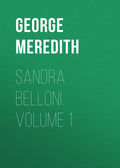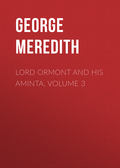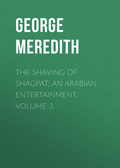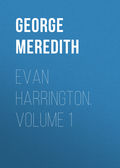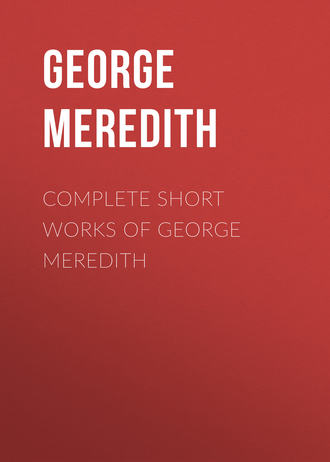
George Meredith
Complete Short Works of George Meredith
CHAPTER III
The splendid equipage of a coach and six, with footmen in scarlet and green, carried Beau Beamish five miles along the road on a sunny day to meet the young duchess at the boundary of his territory, and conduct her in state to the Wells. Chloe sat beside him, receiving counsel with regard to her prospective duties. He was this day the consummate beau, suave, but monarchical, and his manner of speech partook of his external grandeur. ‘Spy me the horizon, and apprise me if somewhere you distinguish a chariot,’ he said, as they drew up on the rise of a hill of long descent, where the dusty roadway sank between its brown hedges, and crawled mounting from dry rush-spotted hollows to corn fields on a companion height directly facing them, at a remove of about three-quarters of a mile. Chloe looked forth, while the beau passingly raised his hat for coolness, and murmured, with a glance down the sultry track: ‘It sweats the eye to see!’
Presently Chloe said, ‘Now a dust blows. Something approaches. Now I discern horses, now a vehicle; and it is a chariot!’
Orders were issued to the outriders for horns to be sounded.
Both Chloe and Beau Beamish wrinkled their foreheads at the disorderly notes of triple horns, whose pealing made an acid in the air instead of sweetness.
‘You would say, kennel dogs that bay the moon!’ said the wincing beau. ‘Yet, as you know, these fellows have been exercised. I have had them out in a meadow for hours, baked and drenched, to get them rid of their native cacophony. But they love it, as they love bacon and beans. The musical taste of our people is in the stage of the primitive appetite for noise, and for that they are gluttons.’
‘It will be pleasant to hear in the distance,’ Chloe replied.
‘Ay, the extremer the distance, the pleasanter to hear. Are they advancing?’
‘They stop. There is a cavalier at the window. Now he doffs his hat.’
‘Sweepingly?’
Chloe described a semicircle in the grand manner.
The beau’s eyebrows rose. ‘Powers divine!’ he muttered. ‘She is let loose from hand to hand, and midway comes a cavalier. We did not count on the hawks. So I have to deal with a cavalier! It signifies, my dear Chloe, that I must incontinently affect the passion if I am to be his match: nothing less.’
‘He has flown,’ said Chloe.
‘Whom she encounters after meeting me, I care not,’ quoth the beau, snapping a finger. ‘But there has been an interval for damage with a lady innocent as Eve. Is she advancing?’
‘The chariot is trotting down the hill. He has ridden back. She has no attendant horseman.’
‘They were dismissed at my injunction ten miles off particularly to the benefit of the cavaliering horde, it would appear. In the case of a woman, Chloe, one blink of the eyelids is an omission of watchfulness.’
‘That is an axiom fit for the harem of the Grand Signior.’
‘The Grand Signior might give us profitable lessons for dealing with the sex.’
‘Distrust us, and it is a declaration of war!’
‘Trust you, and the stopper is out of the smelling-bottle.’
‘Mr. Beamish, we are women, but we have souls.’
‘The pip in the apple whose ruddy cheek allures little Tommy to rob the orchard is as good a preservative.’
‘You admit that men are our enemies?’
‘I maintain that they carry the banner of virtue.’
‘Oh, Mr. Beamish, I shall expire.’
‘I forbid it in my lifetime, Chloe, for I wish to die believing in one woman.’
‘No flattery for me at the expense of my sisters!’
‘Then fly to a hermitage; for all flattery is at somebody’s expense, child. ‘Tis an essence-extract of humanity! To live on it, in the fashion of some people, is bad—it is downright cannibal. But we may sprinkle our handkerchiefs with it, and we should, if we would caress our noses with an air. Society, my Chloe, is a recommencement upon an upper level of the savage system; we must have our sacrifices. As, for instance, what say you of myself beside our booted bumpkin squires?’
‘Hundreds of them, Mr. Beamish!’
‘That is a holocaust of squires reduced to make an incense for me, though you have not performed Druid rites and packed them in gigantic osier ribs. Be philosophical, but accept your personal dues. Grant us ours too. I have a serious intention to preserve this young duchess, and I expect my task to be severe. I carry the banner aforesaid; verily and penitentially I do. It is an error of the vulgar to suppose that all is dragon in the dragon’s jaws.’
‘Men are his fangs and claws.’
‘Ay, but the passion for his fiery breath is in woman. She will take her leap and have her jump, will and will! And at the point where she will and she won’t, the dragon gulps and down she goes! However, the business is to keep our buttercup duchess from that same point. Is she near?’
‘I can see her,’ said Chloe.
Beau Beamish requested a sketch of her, and Chloe began: ‘She is ravishing.’
Upon which he commented, ‘Every woman is ravishing at forty paces, and still more so in imagination.’
‘Beautiful auburn hair, and a dazzling red and white complexion, set in a blue coif.’
‘Her eyes?’
‘Melting blue.’
‘‘Tis an English witch!’ exclaimed the beau, and he compassionately invoked her absent lord.
Chloe’s optics were no longer tasked to discern the fair lady’s lineaments, for the chariot windows came flush with those of the beau on the broad plateau of the hill. His coach door was opened. He sat upright, levelling his privileged stare at Duchess Susan until she blushed.
‘Ay, madam,’ quoth he, ‘I am not the first.’
‘La, sir!’ said she; ‘who are you?’
The beau deliberately raised his hat and bowed. ‘He, madam, of whose approach the gentleman who took his leave of you on yonder elevation informed you.’
She looked artlessly over her shoulder, and at the beau alighting from his carriage. ‘A gentleman?’
‘On horseback.’
The duchess popped her head through the window on an impulse to measure the distance between the two hills.
‘Never!’ she cried.
‘Why, madam, did he deliver no message to announce me?’ said the beau, ruffling.
‘Goodness gracious! You must be Mr. Beamish,’ she replied.
He laid his hat on his bosom, and invited her to quit her carriage for a seat beside him. She stipulated, ‘If you are really Mr. Beamish?’ He frowned, and raised his head to convince her; but she would not be impressed, and he applied to Chloe to establish his identity. Hearing Chloe’s name, the duchess called out, ‘Oh! there, now, that’s enough, for Chloe’s my maid here, and I know she’s a lady born, and we’re going to be friends. Hand me to Chloe. And you are Chloe?’ she said, after a frank stride from step to step of the carriages. ‘And don’t mind being my maid? You do look a nice, kind creature. And I see you’re a lady born; I know in a minute. You’re dark, I’m fair; we shall suit. And tell me—hush!—what dreadful long eyes he has! I shall ask you presently what you think of me. I was never at the Wells before. Dear me! the coach has turned. How far off shall we hear the bells to say I’m coming? I know I’m to have bells. Mr. Beamish, Mr. Beamish! I must have a chatter with a woman, and I’m in awe of you, sir, that I am, but men and men I see to talk to for a lift of my finger, by the dozen, in my duke’s palace—though they’re old ones, that’s true—but a woman who’s a lady, and kind enough to be my maid, I haven’t met yet since I had the right to wear a coronet. There, I’ll hold Chloe’s hand, and that’ll do. You would tell me at once, Chloe, if I was not dressed to your taste; now, wouldn’t you? As for talkative, that’s a sign with me of my liking people. I really don’t know what to say to my duke sometimes. I sit and think it so funny to be having a duke instead of a husband. You’re off!’
The duchess laughed at Chloe’s laughter. Chloe excused herself, but was informed by her mistress that it was what she liked.
‘For the first two years,’ she resumed, ‘I could hardly speak a syllable. I stammered, I reddened, I longed to be up in my room brushing and curling my hair, and was ready to curtsey to everybody. Now I’m quite at home, for I’ve plenty of courage—except about death, and I’m worse about death than I was when I was a simple body with a gawk’s “lawks!” in her round eyes and mouth for an egg. I wonder why that is? But isn’t death horrible? And skeletons!’ The duchess shuddered.
‘It depends upon the skeleton,’ said Beau Beamish, who had joined the conversation. ‘Yours, madam, I would rather not meet, because she would precipitate me into transports of regret for the loss of the flesh. I have, however, met mine own and had reason for satisfaction with the interview.’
‘Your own skeleton, sir!’ said the duchess wonderingly and appalled.
‘Unmistakably mine. I will call you to witness by an account of him.’
Duchess Susan gaped, and, ‘Oh, don’t!’ she cried out; but added, ‘It ‘s broad day, and I’ve got some one to sleep anigh me after dark’; with which she smiled on Chloe, who promised her there was no matter for alarm.
‘I encountered my gentleman as I was proceeding to my room at night,’ said the beau, ‘along a narrow corridor, where it was imperative that one of us should yield the ‘pas;’ and, I must confess it, we are all so amazingly alike in our bones, that I stood prepared to demand place of him. For indubitably the fellow was an obstruction, and at the first glance repulsive. I took him for anybody’s skeleton, Death’s ensign, with his cachinnatory skull, and the numbered ribs, and the extraordinary splay feet—in fact, the whole ungainly and shaky hobbledehoy which man is built on, and by whose image in his weaker moments he is haunted. I had, to be frank, been dancing on a supper with certain of our choicest Wits and Beauties. It is a recipe for conjuring apparitions. Now, then, thinks I, my fine fellow, I will bounce you; and without a salutation I pressed forward. Madam, I give you my word, he behaved to the full pitch as I myself should have done under similar circumstances. Retiring upon an inclination of his structure, he draws up and fetches me a bow of the exact middle nick between dignity and service. I advance, he withdraws, and again the bow, devoid of obsequiousness, majestically condescending. These, thinks I, be royal manners. I could have taken him for the Sable King in person, stripped of his mantle. On my soul, he put me to the blush.’
‘And is that all?’ asked the duchess, relieving herself with a sigh.
‘Why, madam,’ quoth the beau, ‘do you not see that he could have been none other than mine own, who could comport himself with that grand air and gracefulness when wounded by his closest relative? Upon his opening my door for me, and accepting the ‘pas,’ which I now right heartily accorded him, I recognized at once both him and the reproof he had designedly dealt me—or the wine supper I had danced on, perhaps I should say’ and I protest that by such a display of supreme good breeding he managed to convey the highest compliment ever received by man, namely the assurance, that after the withering away of this mortal garb, I shall still be noted for urbanity and elegancy. Nay, and more, immortally, without the slip I was guilty of when I carried the bag of wine.’
Duchess Susan fanned herself to assist her digestion of the anecdote.
‘Well, it’s not so frightful a story, and I know you are the great Mr. Beamish;’ she said.
He questioned her whether the gentleman had signalled him to her on the hill.
‘What can he mean about a gentleman?’ she turned to Chloe. ‘My duke told me you would meet me, sir. And you are to protect me. And if anything happens, it is to be your fault.’
‘Entirely,’ said the beau. ‘I shall therefore maintain a vigilant guard.’
‘Except leaving me free. Oof! I’ve been boxed up so long. I declare, Chloe, I feel like a best dress out for a holiday, and a bit afraid of spoiling. I’m a real child, more than I was when my duke married me. I seemed to go in and grow up again, after I was raised to fortune. And nobody to tell of it! Fancy that! For you can’t talk to old gentlemen about what’s going on in your heart.’
‘How of young gentlemen?’ she was asked by the beau.
And she replied, ‘They find it out.’
‘Not if you do not assist them,’ said he.
Duchess Susan let her eyelids and her underlie half drop, as she looked at him with the simple shyness of one of nature’s thoughts in her head at peep on the pastures of the world. The melting blue eyes and the cherry lip made an exceedingly quickening picture. ‘Now, I wonder if that is true?’ she transferred her slyness to speech.
‘Beware the middle-aged!’ he exclaimed.
She appealed to Chloe. ‘And I’m sure they’re the nicest.’
Chloe agreed that they were.
The duchess measured Chloe and the beau together, with a mind swift in apprehending all that it hungered for.
She would have pursued the pleasing theme had she not been directed to gaze below upon the towers and roofs of the Wells, shining sleepily in a siesta of afternoon Summer sunlight.
With a spread of her silken robe, she touched the edifice of her hair, murmuring to Chloe, ‘I can’t abide that powder. You shall see me walk in a hoop. I can. I’ve done it to slow music till my duke clapped hands. I’m nothing sitting to what I am on my feet. That’s because I haven’t got fine language yet. I shall. It seems to come last. So, there ‘s the place. And whereabouts do all the great people meet and prommy—?’
‘They promenade where you see the trees, madam,’ said Chloe.
‘And where is it where the ladies sit and eat jam tarts with whipped cream on ‘em, while the gentlemen stand and pay compliments?’
Chloe said it was at a shop near the pump room.
Duchess Susan looked out over the house-tops, beyond the dusty hedges.
‘Oh, and that powder!’ she cried. ‘I hate to be out of the fashion and a spectacle. But I do love my own hair, and I have such a lot, and I like the colour, and so does my duke. Only, don’t let me be fingered at. If once I begin to blush before people, my courage is gone; my singing inside me is choked; and I’ve a real lark going on in me all day long, rain or sunshine—hush, all about love and amusement.’
Chloe smiled, and Duchess Susan said, ‘Just like a bird, for I don’t know what it is.’
She looked for Chloe to say that she did.
At the moment a pair of mounted squires rode up, and the coach stopped, while Beau Beamish gave orders for the church bells to be set ringing, and the band to meet and precede his equipage at the head of the bath avenue: ‘in honour of the arrival of her Grace the Duchess of Dewlap.’
He delivered these words loudly to his men, and turned an effulgent gaze upon the duchess, so that for a minute she was fascinated and did not consult her hearing; but presently she fell into an uneasiness; the signs increased, she bit her lip, and after breathing short once or twice, ‘Was it meaning me, Mr. Beamish?’ she said.
‘You, madam, are the person whom we ‘delight to honour,’ he replied.
‘Duchess of what?’ she screwed uneasy features to hear.
‘Duchess of Dewlap,’ said he.
‘It’s not my title, sir.’
‘It is your title on my territory, madam.’
She made her pretty nose and upper lip ugly with a sneer of ‘Dew—! And enter that town before all those people as Duchess of… Oh, no, I won’t; I just won’t! Call back those men now, please; now, if you please. Pray, Mr. Beamish! You’ll offend me, sir. I’m not going to be a mock. You’ll offend my duke, sir. He’d die rather than have my feelings hurt. Here’s all my pleasure spoilt. I won’t and I sha’n’t enter the town as duchess of that stupid name, so call ‘em back, call ‘em back this instant. I know who I am and what I am, and I know what’s due to me, I do.’
Beau Beamish rejoined, ‘I too. Chloe will tell you I am lord here.’
‘Then I’ll go home, I will. I won’t be laughed at for a great lady ninny. I’m a real lady of high rank, and such I’ll appear. What ‘s a Duchess of Dewlap? One might as well be Duchess of Cowstail, Duchess of Mopsend. And those people! But I won’t be that. I won’t be played with. I see them staring! No, I can make up my mind, and I beg you to call back your men, or I’ll go back home.’ She muttered, ‘Be made fun of—made a fool of!’
‘Your Grace’s chariot is behind,’ said the beau.
His despotic coolness provoked her to an outcry and weeping: she repeated, ‘Dewlap! Dewlap!’ in sobs; she shook her shoulders and hid her face.
‘You are proud of your title, are you, madam?’ said he.
‘I am.’ She came out of her hands to answer him proudly. ‘That I am!’ she meant for a stronger affirmation.
‘Then mark me,’ he said impressively; ‘I am your duke’s friend, and you are under my charge here. I am your guardian and you are my ward, and you can enter the town only on the condition of obedience to me. Now, mark me, madam; no one can rob you of your real name and title saving yourself. But you are entering a place where you will encounter a thousand temptations to tarnish, and haply forfeit it. Be warned do nothing that will.’
‘Then I’m to have my own title?’ said she, clearing up.
‘For the month of your visit you are Duchess of Dewlap.’
‘I say I sha’n’t!’
‘You shall.’
‘Never, sir!’
‘I command it.’
She flung herself forward, with a wail, upon Chloe’s bosom. ‘Can’t you do something for me?’ she whimpered.
‘It is impossible to move Mr. Beamish,’ Chloe said.
Out of a pause, composed of sobs and sighs, the duchess let loose in a broken voice: ‘Then I ‘m sure I think—I think I’d rather have met—have met his skeleton!’
Her sincerity was equal to wit.
Beau Beamish shouted. He cordially applauded her, and in the genuine kindness of an admiration that surprised him, he permitted himself the liberty of taking and saluting her fingers. She fancied there was another chance for her, but he frowned at the mention of it.
Upon these proceedings the exhilarating sound of the band was heard; simultaneously a festival peal of bells burst forth; and an admonishment of the necessity for concealing her chagrin and exhibiting both station and a countenance to the people, combined with the excitement of the new scenes and the marching music to banish the acuter sense of disappointment from Duchess Susan’s mind; so she very soon held herself erect, and wore a face open to every wonder, impressionable as the blue lake-surface, crisped here and there by fitful breezes against a level sun.
CHAPTER IV
It was an axiom with Mr. Beamish, our first, if not our only philosophical beau and a gentleman of some thoughtfulness, that the social English require tyrannical government as much as the political are able to dispense with it: and this he explained by an exposition of the character of a race possessed of the eminent virtue of individual self-assertion, which causes them to insist on good elbowroom wherever they gather together. Society, however, not being tolerable where the smoothness of intercourse is disturbed by a perpetual punching of sides, the merits of the free citizen in them become their demerits when a fraternal circle is established, and they who have shown an example of civilization too notable in one sphere to call for eulogy, are often to be seen elbowing on the ragged edge of barbarism in the other. They must therefore be reduced to accept laws not of their own making, and of an extreme rigidity.
Here too is a further peril; for the gallant spirits distinguishing them in the state of independence may (he foresaw the melancholy experience of a later age) abandon them utterly in subjection, and the glorious boisterousness befitting the village green forsake them even in their haunts of liberal association, should they once be thoroughly tamed by authority. Our ‘merrie England’ will then be long-faced England, an England of fallen chaps, like a boar’s head, bearing for speech a lemon in the mouth: good to feast on, mayhap; not with!
Mr. Beamish would actually seem to have foreseen the danger of a transition that he could watch over only in his time; and, as he said, ‘I go, as I came, on a flash’; he had neither ancestry nor descendants: he was a genius, he knew himself a solitary, therefore, in spite of his efforts to create his like. Within his district he did effect something, enough to give him fame as one of the princely fathers of our domestic civilization, though we now appear to have lost by it more than formerly we gained. The chasing of the natural is ever fraught with dubious hazards. If it gallops back, according to the proverb, it will do so at the charge: commonly it gallops off, quite off; and then for any kind of animation our precarious dependence is upon brains: we have to live on our wits, which are ordinarily less productive than land, and cannot be remitted in entail.
Rightly or wrongly (there are differences of opinion about it) Mr. Beamish repressed the chthonic natural with a rod of iron beneath his rule. The hoyden and the bumpkin had no peace until they had given public imitations of the lady and the gentleman; nor were the lady and the gentleman privileged to be what he called ‘free flags.’ He could be charitable to the passion, but he bellowed the very word itself (hauled up smoking from the brimstone lake) against them that pretended to be shamelessly guilty of the peccadilloes of gallantry. His famous accost of a lady threatening to sink, and already performing like a vessel in that situation: ‘So, madam, I hear you are preparing to enrol yourself in the very ancient order?’… (he named it) was a piece of insolence that involved him in some discord with the lady’s husband and ‘the rascal steward,’ as he chose to term the third party in these affairs: yet it is reputed to have saved the lady.
Furthermore, he attacked the vulgarity of persons of quality, and he has told a fashionable dame who was indulging herself in a marked sneer of disdain, not improving to her features, ‘that he would be pleased to have her assurance it was her face she presented to mankind’: a thing—thanks perhaps to him chiefly—no longer possible of utterance. One of the sex asking him why he addressed his persecutions particularly to women: ‘Because I fight your battles,’ says he, ‘and I find you in the ranks of the enemy.’ He treated them as traitors.
He was nevertheless well supported by a sex that compensates for dislike of its friend before a certain age by a cordial recognition of him when it has touched the period. A phalanx of great dames gave him the terrors of Olympus for all except the natively audacious, the truculent and the insufferably obtuse; and from the midst of them he launched decree and bolt to good effect: not, of course, without receiving return missiles, and not without subsequent question whether the work of that man was beneficial to the country, who indeed tamed the bumpkin squire and his brood, but at the cost of their animal spirits and their gift of speech; viz. by making petrifactions of them. In the surgical operation of tracheotomy, a successful treatment of the patient hangs, we believe, on the promptness and skill of the introduction of the artificial windpipe; and it may be that our unhappy countrymen when cut off from the source of their breath were not neatly handled; or else that there is a physical opposition in them to anything artificial, and it must be nature or nothing. The dispute shall be left where it stands.
Now, to venture upon parading a beautiful young Duchess of Dewlap, with an odour of the shepherdess about her notwithstanding her acquired art of stepping conformably in a hoop, and to demand full homage of respect for a lady bearing such a title, who had the intoxicating attractions of the ruddy orchard apple on the tree next the roadside wall, when the owner is absent, was bold in Mr. Beamish, passing temerity; nor would even he have attempted it had he not been assured of the support of his phalanx of great ladies. They indeed, after being taken into the secret, had stipulated that first they must have an inspection of the transformed dairymaid; and the review was not unfavourable. Duchess Susan came out of it more scatheless than her duke. She was tongue-tied, and her tutored walking and really admirable stature helped her to appease, the critics of her sex; by whom her too readily blushful innocence was praised, with a reserve, expressed in the remark, that she was a monstrous fine toy for a duke’s second childhood, and should never have been let fly from his nursery. Her milliner was approved. The duke was a notorious connoisseur of female charms, and would see, of course, to the decorous adornment of her person by the best of modistes. Her smiling was pretty, her eyes were soft; she might turn out good, if well guarded for a time; but these merits of the woman are not those of the great lady, and her title was too strong a beam on her character to give it a fair chance with her critics. They one and all recommended powder for her hair and cheeks. That odour of the shepherdess could be exorcised by no other means, they declared. Her blushing was indecent.
Truly the critics of the foeman sex behaved in a way to cause the blushes to swarm rosy as the troops of young Loves round Cytherea in her sea-birth, when, some soaring, and sinking some, they flutter like her loosened zone, and breast the air thick as flower petals on the summer’s breath, weaving her net for the world. Duchess Susan might protest her inability to keep her blushes down; that the wrong was done by the insolent eyes, and not by her artless cheeks. Ay, but nature, if we are to tame these men, must be swathed and concealed, partly stifled, absolutely stifled upon occasion. The natural woman does not move a foot without striking earth to conjure up the horrid apparition of the natural man, who is not as she, but a cannibal savage. To be the light which leads, it is her business to don the misty vesture of an idea, that she may dwell as an idea in men’s minds, very dim, very powerful, but abstruse, unseizable. Much wisdom was imparted to her on the subject, and she understood a little, and echoed hollow to the remainder, willing to show entire docility as far as her intelligence consented to be awake. She was in that stage of the dainty, faintly tinged innocence of the amorousness of themselves when beautiful young women who have not been caught for schooling in infancy deem it a defilement to be made to appear other than the blessed nature has made them, which has made them beautiful, and surely therefore deserves to be worshipped. The lectures of the great ladies and Chloe’s counsels failed to persuade her to use the powder puff-ball. Perhaps too, as timidity quitted her, she enjoyed her distinctiveness in their midst.
But the distinctiveness of a Duchess of Dewlap with the hair and cheeks of our native fields, was fraught with troubles outrunning Mr. Beamish’s calculations. He had perceived that she would be attractive; he had not reckoned on the homogeneousness of her particular English charms. A beauty in red, white, and blue is our goddess Venus with the apple of Paris in her hand; and after two visits to the Pump Room, and one promenade in the walks about the Assembly House, she had as completely divided the ordinary guests of the Wells into male and female in opinion as her mother Nature had done in it sex. And the men would not be silenced; they had gazed on their divinest, and it was for the women to succumb to that unwholesome state, so full of thunder. Knights and squires, military and rural, threw up their allegiance right and left to devote themselves to this robust new vision, and in their peculiar manner, with a general View-halloo, and Yoicks, Tally-ho, and away we go, pelt ahead! Unexampled as it is in England for Beauty to kindle the ardours of the scent of the fox, Duchess Susan did more—she turned all her followers into hounds; they were madmen: within a very few days of her entrance bets raged about her, and there were brawls, jolly flings at her character in the form of lusty encomium, givings of the lie, and upon one occasion a knock-down blow in public, as though the place had never known the polishing touch of Mr. Beamish.
He was thrown into great perplexity by that blow. Discountenancing the duel as much as he could, an affair of the sword was nevertheless more tolerable than the brutal fist: and of all men to be guilty of it, who would have anticipated the young Alonzo, Chloe’s quiet, modest lover! He it was. The case came before Mr. Beamish for his decision; he had to pronounce an impartial judgement, and for some time, during the examination of evidence, he suffered, as he assures us in his Memoirs, a royal agony. To have to strike with the glaive of Justice them whom they most esteem, is the greatest affliction known to kings. He would have done it: he deserved to reign. Happily the evidence against the gentleman who was tumbled, Mr. Ralph Shepster, excused Mr. Augustus Camwell, otherwise Alonzo, for dealing with him promptly to shut his mouth.
This Shepster, a raw young squire, ‘reeking,’ Beau Beamish writes of him, ‘one half of the soil, and t’ other half of the town,’ had involved Chloe in his familiar remarks upon the Duchess of Dewlap; and the personal respect entertained by Mr. Beamish for Chloe so strongly approved Alonzo’s championship of her, that in giving judgement he laid stress on young Alonzo’s passion for Chloe, to prove at once the disinterestedness of the assailant, and the judicial nature of the sentence: which was, that Mr. Ralph Shepster should undergo banishment, and had the right to demand reparation. The latter part of this decree assisted in effecting the execution of the former. Shepster declined cold steel, calling it murder, and was effusive of nature’s logic on the subject.
‘Because a man comes and knocks me down, I’m to go up to him and ask him to run me through!’
His shake of the head signified that he was not such a noodle. Voluble and prolific of illustration, as is no one so much as a son of nature inspired to speak her words of wisdom, he defied the mandate, and refused himself satisfaction, until in the strangest manner possible flights of white feathers beset him, and he became a mark for persecution too trying for the friendship of his friends. He fled, repeating his tale, that he had seen ‘Beamish’s Duchess,’ and Chloe attending her, at an assignation in the South Grove, where a gentleman, unknown to the Wells, presented himself to the adventurous ladies, and they walked together—a tale ending with nods.



